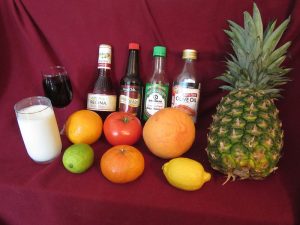Marinades are one sure way to take care of the ‘gamey’ taste – real or imagined, usually imagined – of wild game meat. Some may find bear meat, even deer meat, to have a slightly strong taste; others will not. “It doesn’t taste like beef,” is not a legitimate complaint, because it isn’t beef. If there is a stronger taste than you prefer, marinating any meat will add a flavor you like.
There are several options:
- Any acid-based liquid will work, such as milk or a weak vinegar-water solution (1 cup vinegar to 1 gallon water), citric juices (orange, lemon, lime, grapefruit, clementines, tangerines), tomato juice, Italian salad dressing. Tomato juice will neutralize strong odors. (We will not mention dogs and skunk spay here.) The naturally high acidic content of tomato juice also helps tenderize meat.
- Many berries, except blueberries, contain naturally occurring citric acid. Berries with higher amounts of citric acid include strawberries, raspberries, cranberries, red and black currants, and gooseberries. Pineapple contains citric acid. Stone fruits, such as cherries, peaches and apricots, also contain citric acid.
- After it is marinated, cook any big game meat as you would beef. As with most cooking, a bit of experimentation may be necessary to find the preparation methods, cooking times, degree of doneness, marinades and recipes you prefer.
- Be sure not to overcook the meat. Bear meat and pork are the only meats that must be cooked to an internal temperature of 170 degrees F., which makes them well done (not the same as overcooked) to eliminate the possibility of trichinosis.
Wine Is Fine
Wine works well in many wild game recipes (and in many wild game cooks). Wine can be a meat tenderizer in a meat marinade, or it can be a seasoning. Wine is as easy to use as salt and pepper, and it brings food flavors together in interesting ways. The alcohol evaporates as the wine cooks, leaving only the fine flavor, making it acceptable for use in any family recipe.
To use wine in recipes that don’t call for it, just substitute it for part of the other liquids called for. Use a good table wine in your cooking instead of a cooking wine. You will like the results better. Red meats can be cooked with red wines; they generally have richer or more robust flavors.
Marinating Notes:
1) If a marinade is used on meat and drained off, then reused to baste the meat during cooking, the marinade must be heated to the boiling point for 1-2 minutes before it is reused. Bacteria from the meat could be in the marinade and make it unsafe if it isn’t reheated.
2) No matter which marinade you use, cover the meat and refrigerate it for the entire marinating process.
3) Foods can be marinated up to 48 hours, but 24 hours usually is long enough for the marinade to penetrate the meat, thus adding flavor. Marinate meat at least 4 hours; 8 hours is better. When using commercial marinades, follow instructions on the package.
4) Do not cut chops or steaks until ready to marinate or cook. Any cut creates water loss from the meat; thus, the earlier the cuts, the more the meat will have dried before you’re ready to work with it.
MARINADE FOR POT ROAST
½ C. olive oil
¼ C. vinegar
1 tsp. celery seed
1 tsp. salt
2 C. beef broth
2 C. wine
2 stalks celery, chopped with leaves
2 carrots, chopped
1 med. onion, sliced
2 cloves garlic, minced
8 peppercorns
Few sprigs fresh parsley
Venison roast
Mix above ingredients; pour over roast in large non-metal bowl or zip-lock bag (nice to use because you can stir and mix without getting your hands dirty). Marinate for 4-24 hours in the refrigerator. Remove meat and vegetables from marinade and discard marinade. Roll meat in flour seasoned with salt and pepper. Brown meat on all sides in hot vegetable oil. Place roast and vegetables in roasting pan, cover and roast at 425 degrees for 10-12 minutes per pound.
Note: Marinade can also be used for chops and other cuts of meat.
MEAT MARINADE
½ tsp. garlic powder per pound of meat
Red wine
Rub garlic powder into meat. Place meat in a container and cover meat with red wine. If desired (with tough meat), use meat tenderizer as directed in the marinade. Cover and refrigerate for eight or more hours, or overnight.
When grilling the meat after marinating, use the marinade liquid to baste the meat. You can also use this marinade when roasting meat in a Dutch oven. It does wonders to and for meat.
RED WINE MARINADE
Mix 1 cup dry red wine, 2 cloves garlic, 2 tbsp. white vinegar, 1 cup cooking oil, 1 small onion (minced), and 1 tsp. salt. Marinate a three-pound round steak overnight in a non-metal container, being sure the meat is covered, or turning it a couple of times. Grill the meat, brushing with marinade.
ONE OTHER THING: “Marinade” is the liquid that you “marinate” meat in. These two words sometimes get tangled up.
This is part of How-To Chapter 10 – Bear On The Table — of THE BEAR HUNTING OBSESSION OF A DRIVEN MAN, by Bill Wiesner, with Glenn Helgeland. Most of the content was contributed by Glenn’s wife Judy, with the balance borrowed from two wild game cookbooks they wrote and published through their company, Target Communications Outdoor Books LLC.


